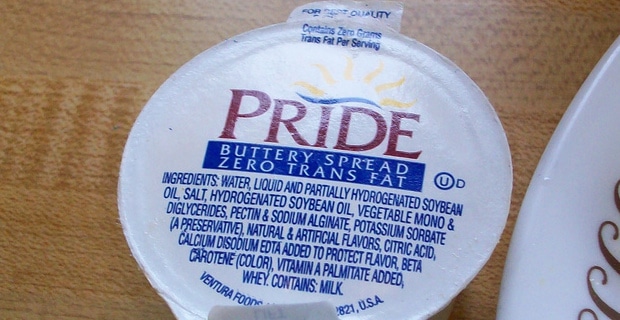
Partially hydrogenated oil is an example of something that is potentially good being turned into something that is definitely bad. The hydrogenation process eventually converts factors that have some healthful qualities (e.g., polyunsaturated fatty acids and monounsaturated fatty acids) into harmful trans fats that can take a negative toll on your body.
The food industry has had a long love affair with partially hydrogenated oils because they are inexpensive and they increase shelf life and flavor stability. Evidence of the health hazards associated with consumption of trans fat became increasingly apparent, however, and that awareness resulted in the Food and Drug Administration requiring food manufacturers to state the amount of trans fat on their products, a regulation that became effective in 2006. A trans fat ban is currently being considered.
Although some food industry members have significantly reduced the amount of trans fat in their products, the dangerous ingredient has definitely not left the building. Consumers are urged to read labels carefully for the presence of partially hydrogenated oils, especially in snack foods, margarines, frozen foods, baked goods, coffee creamers, microwave popcorn, crackers, refrigerated dough products, and ready-to-eat frostings.
1. Trans Fats Lower Good Cholesterol
A lowering of high-density lipoprotein (HDL) cholesterol has been associated with an increased risk of heart disease.
2. Trans Fats Raise Bad Cholesterol
Similarly, a rise in low-density lipoprotein (LDL) cholesterolcan raise the risk of heart disease.
3. Trans Fats Impair Memory
A recent study presented at the American Heart Association (November 2014) reported that young and middle-aged men who had a higher intake of trans fat showed poorer performance on memory tests than did those who consumed less of the fat. Too few women were in the study to make the same statement about females.
4. Trans Fats Increase Alzheimer’s Risk
Thus far the research linking the risk of Alzheimer’s disease and other dementias and the intake of trans fat has resulted in mixed results. One Chicago study did find a more rapid decline in cognition among older people who had high intakes of copper along with a diet high in saturated and trans fats. A German research team also reported that intake of trans fatty acids “potentially increases the AD risk or causes an earlier onset of the disease.”
5. Trans Fats Raise Ovarian Cancer Risk
The authors of a British Journal of Cancer study reported a higher risk of epithelial ovarian cancer associated with higher intake of trans fat. In contrast, their findings suggested a protective effect associated with intake of omega-3 fatty acids.
6. Trans Fats Affect Non-Hodgkin’s Lymphoma Risk
A Mayo Clinic study reported that a diet high in trans fats, processed meats, and high-fat dairy foods was associated with a higher risk of non-Hodgkin’s lymphoma.
7. Trans Fats Increase Depression Risk
A Spanish study called the SUN Project found a detrimental relationship between consumption of trans fat and depression and a positive relationship between intake of olive oil andmonounsaturated fats and depression.
8. Trans Fats Promote Aggression
The results of a study involving nearly 1,000 men and women suggest that dietary intake of trans fats are associated with greater aggression and irritability. Trans fats inhibit the production of omega-3 fatty acids, which in experiments have been shown to reduce aggression.
Remember that just because a Nutrition Facts label says the trans fat content is 0 g per serving, the law allows manufacturers to say the amount is zero even if the level is up to 0.4 g per serving. That’s why it’s important to read the ingredients and look for the words “partially hydrogenated oil, “hydrogenated oil,” and “shortening.”
READ MORE: Trans Fat Robs Memory and Makes You Irritable >>
Image: mcsquishee






